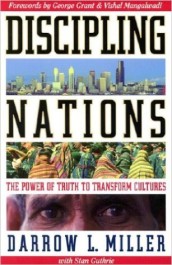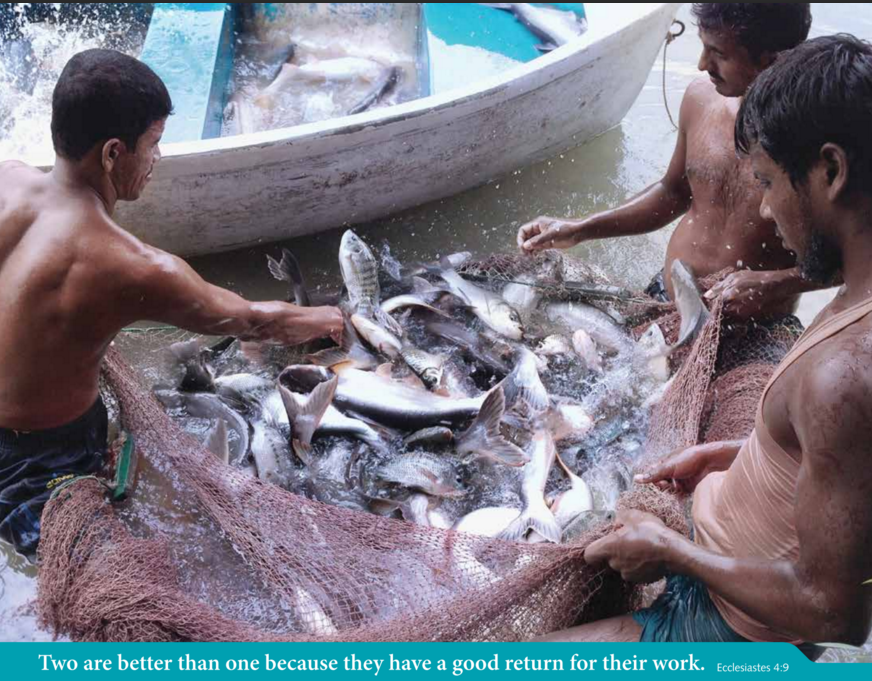One book, followed by one conference … the rest is history.
John and Kate Marsden, then with Food for the Hungry, Bangladesh, invited Darrow to facilitate a workshop in 2002. Kent [last name withheld by request] met Darrow at that gathering. He resonated with the material.
 A year or two before that meeting a colleague had given Kent a copy of Discipling Nations. When he read about exposing lies in the culture and speaking truth, he realized “That’s what we’re doing in Bangladesh!”
A year or two before that meeting a colleague had given Kent a copy of Discipling Nations. When he read about exposing lies in the culture and speaking truth, he realized “That’s what we’re doing in Bangladesh!”
What lies? Two of the big ones were fatalism—“Humans are powerless to help themselves” and sexism—“Men are superior to women.”
The society seemed to have no lack of needs. And the gospel was the good news to speak truth to the lies. The question Kent had was how to add depth and focus to the message.
“Many Christian organizations and individuals are afraid of using message-driven media strategies,” Kent reflected. “They know they could be shut down by the government, or even by zealous Muslims, particularly if the message is religious in nature.”
Darrow’s book gave Kent the inspiration and added focus to impart a biblical worldview through his messaging. He was able to overcome the challenges, and communicate with a renewed sense of purpose.
Kent and his crew began carefully crafting messages grounded in God’s Word that identified the behavior changes that would come from a biblical worldview. These messages began to resonate with society. Audiences began to listen as they heard truth being effectively applied to their social and spiritual situation.
They wrote scripts for live theater and took them to the stage. They produced many 20-30 minute plays teaching biblical values for local communities.
They treated topics that rang true with people’s real lives: maternal health, abuses of the dowry system, feuds between villages, corruption and many more. Working through NGOs, they conducted dramas in community squares, schools, and other public places. These small-scale events led to new partnerships and long-term awareness initiatives with NGOs. Through the trust built by their drama teams, NGO staff members gained needed access to serve communities.
 Eventually, out of these efforts BCM emerged. At first organically connected to SIM, BCM is now an independent company. They are producing a variety of materials, including calendars (go here to download their 2016 edition) within their design component, as well as a variety of video productions within their film component, all of which present the gospel in culturally relevant and practical ways.
Eventually, out of these efforts BCM emerged. At first organically connected to SIM, BCM is now an independent company. They are producing a variety of materials, including calendars (go here to download their 2016 edition) within their design component, as well as a variety of video productions within their film component, all of which present the gospel in culturally relevant and practical ways.
Finally, people have been able to see a different way to live, a better way.
In fact, their first feature film, Boishaki Gan (New Year’s Song), was released in 2013. The movie, based on Charles Dicken’s A Christmas Carol, features professional actors. (Click below to watch the trailer.)
In the meantime, DNA’s online training, Coram Deo, is proving of benefit to BCM. One staff member has completed the course, and several others (including Kent) are at various stages of completion.
Kent wants to translate and dub Coram Deo for a Bengali audience. He believes the course holds great potential for the Bengali culture and for the church.
There is a vast lack of leadership in Bangladesh. Christian leaders tend to lead from a position of power. Servant leadership – living by example – is virtually an unknown quality. Christian leaders, including pastors, generally operate within typical Bengali cultural norms. People learn to fear the pastor instead of being shepherded by him. It’s at a critical point now as the next generation of pastors is replacing those before them.
“The hope we have is that we can still invest in older leaders,” Kent says, “can show them that they still have a voice and that they can influence younger leaders.”
Now is the time for BCM to move into the area of influencing the church by providing appropriate training resources and to network with them and other like-minded Christian organizations.
Bangladesh is less than one percent Christian. What’s more, as is true in many places, Christianity is superficial. There is often little correlation between profession and behavior. In fact, Bengali Christians have a poor reputation because many of them do things Muslims won’t tolerate: like eating pork and drinking alcohol. For many Christians, such habits may not be critical issues. But as Christian young people slide into promiscuity, and Christian households fall short of Muslim moral and ethical standards, it’s time for intervention.
“We need these kinds of discipleship programs [like Coram Deo] desperately,” Kent believes. “The church is going in a bad direction. We are seeing too much corruption, too many lies. Discipleship within the church is at a critical low right now evidenced by more and more churches discontinuing youth programs altogether or watching them become gatherings that lack moral and spiritual instruction.
“We know that people come to faith because they see good things from those who live out a biblical lifestyle. They won’t come to faith in Christ as long as Christians aren’t acting like Christ.”



